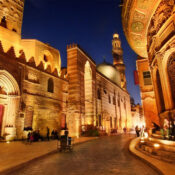Discovering Nubian Culture: A Unique Egyptian Experience

Discovering Nubian Culture: A Unique Egyptian Experience
Exploring Egypt’s rich cultural landscape often brings to mind its pharaohs, pyramids, and ancient temples. However, tucked away in the southern reaches of the country lies a treasure trove of heritage: Nubian culture. Vibrant, colorful, and deeply rooted in history, Nubian culture offers an entirely unique experience for travelers seeking to go beyond the mainstream attractions. Let’s delve into the heart of Nubia and discover its distinct traditions, art, and way of life, all while learning how Guides Touristic Egypt can enhance your journey.
The Origins of Nubian Culture
H2: Historical Roots of Nubia
Nubia, located along the Nile River in what is now southern Egypt and northern Sudan, boasts a history that predates the pharaohs. Known as the “Land of Gold,” it served as a critical crossroads for trade and cultural exchange between Africa and the Mediterranean world. The Nubian people developed a rich civilization marked by advanced architecture, skilled craftsmanship, and a profound connection to the Nile.
H3: The Kingdoms of Kush and Nubia
The Kingdoms of Kush and other Nubian dynasties were powerful players in ancient times, even ruling over Egypt during the 25th Dynasty. Their pyramids, smaller but no less significant than those in Giza, stand as testaments to their advanced society. These ancient landmarks provide fascinating insights into a civilization that thrived alongside yet distinct from ancient Egypt.
H4: Influence on Modern Nubian Identity
Despite centuries of change, modern Nubians maintain strong ties to their ancestral heritage. This is reflected in their language, music, art, and traditions, which continue to thrive in villages along the Nile.
Exploring Nubian Villages
H2: Aswan: The Gateway to Nubia
The city of Aswan serves as the perfect starting point for exploring Nubian culture. Known for its tranquil atmosphere and breathtaking Nile views, Aswan is home to numerous Nubian villages that welcome visitors with open arms.
H3: A Walk Through Elephantine Island
One of the most accessible Nubian communities is found on Elephantine Island. Here, you can wander through vibrant villages adorned with colorful murals depicting scenes of daily life, nature, and Nubian mythology. The island is also an excellent place to interact with locals and learn about their customs.
H4: The Hospitality of Gharb Soheil
Another must-visit location is Gharb Soheil, a Nubian village celebrated for its warm hospitality. Visitors can experience traditional Nubian houses, taste authentic cuisine, and shop for handmade crafts such as jewelry and textiles.
Nubian Art and Music
H2: The Colors of Nubia
Art is an integral part of Nubian culture, characterized by bold, vibrant colors and geometric patterns. These designs are visible in everything from house decorations to pottery and textiles.
H3: Music: The Soul of Nubia
Music plays a central role in Nubian life. Traditional Nubian instruments such as the oud and tar are used to create melodies that have been passed down for generations. Songs often tell stories of love, history, and the deep connection to the Nile River.
H4: The Role of Dance in Celebrations
Dance is another significant aspect of Nubian culture. Whether during weddings or festivals, the rhythmic movements and colorful attire of Nubian dancers captivate audiences and offer a glimpse into their joyous way of life.
Nubian Cuisine: A Taste of Tradition
H2: Unique Flavors of Nubian Food
Nubian cuisine is a delightful blend of African and Middle Eastern influences. Staples include lentils, beans, and freshly baked bread, often accompanied by flavorful spices and herbs.
H3: Popular Dishes to Try
- Kofta: Grilled meat skewers seasoned with Nubian spices.
- Molokhia: A hearty soup made from jute leaves.
- Feteer: A flaky pastry filled with sweet or savory ingredients.
H4: Sharing a Meal with Locals
Dining with a Nubian family is an unforgettable experience. It’s an opportunity to not only savor authentic dishes but also connect with the warm and welcoming people who call Nubia home.
The Role of the Nile in Nubian Life
H2: The Lifeline of Nubia
The Nile River is more than a water source for Nubians; it’s the backbone of their culture and traditions. From fishing and farming to transportation, the Nile influences every aspect of daily life.
H3: Traditional Felucca Rides
A felucca ride along the Nile offers a serene way to appreciate the natural beauty of Nubia. These traditional wooden sailboats provide stunning views of the river and its surroundings.
H4: Celebrations on the Nile
Many Nubian festivals and ceremonies take place on or near the river, highlighting its significance as a cultural and spiritual hub.
Preserving Nubian Heritage
H2: Challenges Facing Nubian Culture
Despite its richness, Nubian culture faces challenges, including displacement due to dam construction and limited awareness of its significance.
H3: Efforts to Preserve Traditions
Organizations and local communities are working tirelessly to preserve Nubian heritage through cultural festivals, educational programs, and sustainable tourism.
H4: How Travelers Can Support Nubia
By choosing responsible tourism practices and supporting initiatives like Guides Touristic Egypt, visitors can contribute to the preservation of this unique culture while enjoying an enriching travel experience.
Planning Your Nubian Adventure
H2: Why Choose Guides Touristic Egypt
To fully immerse yourself in Nubian culture, partnering with knowledgeable guides is essential. Guides Touristic Egypt offers tailored experiences that highlight the best of Nubian heritage while ensuring your trip is both informative and enjoyable.
H3: Tips for a Memorable Visit
- Respect local customs and traditions.
- Learn a few phrases in the Nubian language.
- Bring a small gift as a token of appreciation when visiting a local family.
H4: Best Time to Visit
The cooler months from October to April are ideal for exploring Nubia, as the weather is more comfortable for outdoor activities.
Conclusion
Nubian culture is a vibrant and essential part of Egypt’s identity, offering travelers a unique glimpse into a world of rich traditions, art, and hospitality. From the colorful villages of Aswan to the soulful music and delectable cuisine, every aspect of Nubian life tells a story worth discovering. With the expertise of Guides Touristic Egypt, your journey into the heart of Nubia promises to be an unforgettable experience.



